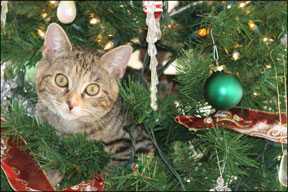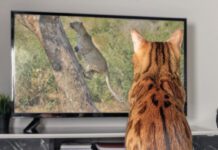Cats, being the inquisitive creatures they are, appreciate things that are new and different. Because the holidays bring an array of novel and interesting stimuli into the home, the curious kitty can certainly get into trouble. Bev Caldwell 288 For the climbing kitty, a holiday tree offers the excitement of the outdoors inside the home, and even an undecorated tree is not without risk. Unless the tree is anchored, the results can be devastating. “Ive heard many stories about Christmas trees coming down,” says Pamela Perry, DVM, lecturer in farm-animal behavior at Cornell Universitys College of Veterinary Medicine. Anchoring your tree to the ceiling or back wall with a cup hook and some wire or string may keep your cat and your tree from coming to harm. If your cat enjoys chewing on greens, he may dine on the trees needles, and having an artificial tree may not discourage a persistent feline from choosing the branches as a midnight buffet. A light coating of something distasteful on the lower branches may keep kitty from snacking on them. “Peppermint or other pungent oils may dissuade your cat from eating your tree,” says Dr. Perry. “Cats noses are sensitive, so mix it in a spray bottle and spray the areas you dont want your cat to attack.” Not all cats dislike the same things, so you may need to experiment. Light applications of wasabi paste, tabasco sauce or citrus may also do the trick. If you have a live tree, keep your cat away from the water used to keep the tree fresh. “Use plain water that has no chemicals added,” says Dr. Perry. Decorations Aren’t Toys. A decorated tree can become a new play station for the cat looking to increase her gaming quotient. Many tree ornaments are made of materials such as glass or ceramics that can easily shatter. Rather than risking the favorite heirloom as well as the cat, hang ornaments of cloth, straw, wood or other nonbreakable materials at a cats eye level. “Place cat-friendly ornaments at the bottom of the tree,” says Dr. Perry, “and tie them to the tree with cloth loops rather than hooks.” To a cat intrigued by the apparent movement of shiny metallic tinsel, all that glitters is not good. While Dr. Perry was a veterinary student, her cat, Chester, gobbled some tinsel from her Christmas tree. “Some cats like shiny things,” says Dr. Perry. The giveaway that Chester had eaten the tinsel was that he vomited up much of it. For other cats, tinsel may work its way into the digestive tract and become lodged in the intestines. Some of it may make it all the way through to be expelled through the anus, but other material may require surgery to remove. “If a piece of tinsel gets wrapped around the base of the tongue before being fully swallowed, it acts like a piano wire as the cat is digesting and perforates the intestines,” says Dr. Perry. “Its very life-threatening.” Other holiday decorations can pose problems as well. “Chewing on things like little bulbs, wires, phone cords and electrical cords – especially when they are plugged in – is all dangerous to your pet,” says Dr. Perry. To keep a cat away from cords of any kind, tie up the cords or place them in a heavy plastic cord protector, available at hardware stores. Cord protectors can be cut to the length desired and some can attach to the wall or baseboard. If you have a party, make certain that your cat is safely tucked away so he doesnt run out the door. Many cats, however, avoid strangers and prefer to hide when guests arrive. Have a quiet room that is off-limits to guests for your pets. When wrapping presents, avoid long ribbon ties, especially if you place them under a tree. “Cats like to chew novel things, so make sure its safe,” says Dr. Perry. “If its not safe for a child, its not safe for a cat.”



